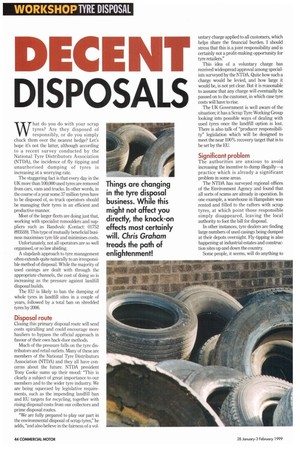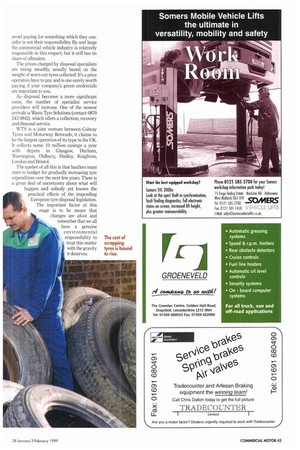,CENT
Page 46

Page 47

If you've noticed an error in this article please click here to report it so we can fix it.
DISPOSALS
What do you do with your scrap tyres? Are they disposed of responsibly, or do you simply chuck them over the nearest hedge? Let's hope it's not the latter, although according to a recent survey conducted by the National Tyre Distributors Association (NTDA), the incidence of fly tipping and unauthorised dumping of tyres it-. increasing at a worrying rate.
The staggering fact is that every day in the UK more than 100,000 used tyres are removed from cars, vans and trucks. In other words, in the course of a year some 37 million tyres have to be disposed of, so truck operators should be managing their tyres in an efficient and productive manner.
Most of the larger fleets are doing just that, working with specialist remoulders and suppliers such as Bandvulc (Contact: 01752 893559). This type of mutually beneficial business maximises tyre life and minimises costs.
Unfortunately, not all operators are so well organised, or so law abiding.
A slapdash approach to tyre management often extends quite naturally to an irresponsible method of disposal. While the majority of used casings are dealt with through the appropriate channels, the cost of doing so is increasing as the pressure against landfill disposal builds.
The EU is likely to ban the dumping of whole tyres in landfill sites in a couple of years, followed by a total ban on shredded tyres by 2006.
Disposal route
Closing this primary disposal route will send costs spiralling and could encourage more hauliers to bypass the official approach in favour of their own back-door methods.
Much of the pressure falls on the tyre distributors and retail outlets. Many of these are members of the National Tyre Distributors Association (NTDA) and they all have concerns about the future. NTDA president Tony Cooke sums up their mood: "This is clearly a subject of great importance to our members and to the wider tyre industry. We are being squeezed by legislative requirements, such as the impending landfill ban and EU targets for recycling, together with rising disposal costs from our collectors and prime disposal routes.
"We are fully prepared to play our part in the environmental disposal of scrap tyres," he adds, "and also believe in the fairness of a vol untary charge applied to all customers, which helps share the financial burden. I should stress that this is a joint responsibility and is certainly not a profit-making opportunity for tyre retailers."
This idea of a voluntary charge has received widespread approval among specialists surveyed by the NTDA. Quite how such a charge would be levied, and how large it would be, is not yet clear. But it is reasonable to assume that any charge will eventually be passed on to the customer, in which case tyre costs will have to rise.
The UK Government is well aware of the situation; it has a Scrap Tyre Working Group looking into possible ways of dealing with used tyres once the landfill option is lost. There is also talk of "producer responsibility" legislation which will be designed to meet the near 100% recovery target that is to be set by the EU.
Significant problem
The authorities are anxious to avoid increasing the incentive to dump illegally—a practice which is already a significant problem in some areas.
The NTDA has surveyed regional offices of the Environment Agency and found that all sorts of scams are already in operation. In one example, a warehouse in Hampshire was rented and filled to the rafters with scrap tyres, at which point those responsible simply disappeared, leaving the local authority to foot the bill for disposal.
In other instances, tyre dealers are finding large numbers of used casings being dumped at their depots overnight. Fly-tipping is also happening at industrial estates and construction sites up and down the country.
Some people, it seems, will do anything to avoid paying for something which they consider is not their responsibility. By and large the commercial vehicle industry is relatively responsible in this respect, but it still has its share of offenders.
The prices charged by disposal specialists are rising steadily, usually based on the weight of worn-out tyres collected. It's a price operators have to pay and is one surely worth paying if your company's green credentials are important to you.
As disposal becomes a more significant issue, the number of specialist service providers will increase. One of the newest arrivals is Waste Tyre Solutions (contact; 0870 243 0842), which offers a collection, recovery and disposal service.
wrs is a joint venture between Colway Tyres and Motorway Retreads; it claims to be the largest operation of its type in the UK. It collects some 10 million casings a year with depots in Glasgow, Durham, Warrington, Oldbury, Dudley, Knighton, London and Bristol.
The upshot of all this is that hauliers must start to budget for gradually increasing tyre expenditure over the next few years. There is a great deal of uncertainty about what will happen and nobody yet knows the practical effects of the impending European tyre disposal legislation.
The important factor at this stage is to be aware that changes are afoot and remember that we all have a genuine environmental responsibility to treat this matter with the gravity it deserves.








































































































